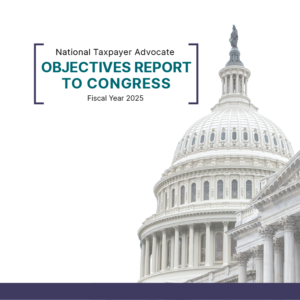National Taxpayer Advocate Erin M. Collins today released her statutorily mandated midyear report to Congress. The report says the tax return filing season generally ran smoothly this year, but it identifies delays in issuing refunds to identity theft victims, misleading telephone measures that lead to poor resource allocation decisions, and delays in processing Employee Retention Credit claims as key taxpayer challenges. The report also emphasizes the importance of technology upgrades as the IRS seeks to modernize its operations in the coming years.
“For most taxpayers, the filing season is the only time they interact with the IRS,” Collins wrote. “After several years of abysmal taxpayer service during the COVID-19 pandemic, the IRS has now delivered two filing seasons that demonstrate the agency has restored service to pre-pandemic levels and has improved in most, but not all, areas of service. This is excellent news for most taxpayers.”
Despite these improvements, the report says the IRS has fallen behind on processing identity theft victim assistance cases. As of April 2024, there were approximately 500,000 unresolved cases in its inventory that were taking more than 22 months to resolve, followed by several additional weeks to issue refunds. Collins called the delays “unconscionable” in her prior report, and she reiterated that concern in this report. “Delays of nearly two years make a mockery of the right to quality service in the Taxpayer Bill of Rights,” Collins wrote. “The IRS must prioritize assistance for these victims and fix this problem quickly.”
The report also identifies TAS’s key objectives for the upcoming fiscal year, including 11 systemic advocacy objectives, five case advocacy and other business objectives, and four research objectives.
Among the objectives the report identifies are the following:
- Modernize IRS processing to increase efficiency and improve the taxpayer experience;
- Improve IRS employee hiring, recruitment, retention, and training processes; and
- Enhance IRS transparency by improving applicable technology, sufficiently explaining modernization progress, and providing straightforward guidance on tax law.
The National Taxpayer Advocate is required by statute to submit a year-end report to Congress that, among other things, makes administrative recommendations to resolve taxpayer problems. The National Taxpayer Advocate made 78 administrative recommendations in her 2023 report, and the IRS has agreed to implement 62 (or 79 percent) of the recommendations in full or in part.
The National Taxpayer Advocate blogs about key issues in tax administration. Individuals may subscribe to the blog and read past blogs.
About the Taxpayer Advocate Service
TAS is an independent organization within the IRS. TAS helps taxpayers resolve problems with the IRS, makes administrative and legislative recommendations to prevent or correct the problems, and protects taxpayer rights. To contact TAS, visit www.TaxpayerAdvocate.irs.gov/contact-us; check your local directory; or call TAS toll-free at 877-777-4778. To get help any time with general tax topics or to learn more about the Taxpayer Bill of Rights, visit www.TaxpayerAdvocate.irs.gov. Get updates on tax topics at facebook.com/YourVoiceAtIRS, Twitter.com/YourVoiceatIRS, linkedin.com/company/taxpayer-advocate-service, and YouTube.com/TASNTA.
The Taxpayer Roadmap, a project of TAS, illustrates at a very high level the stages of a taxpayer’s journey, from filing a tax return all the way through audits, appeals, collection, and litigation. This tool can help taxpayers identify where their tax return is in the system and what they may need to do or expect next.

